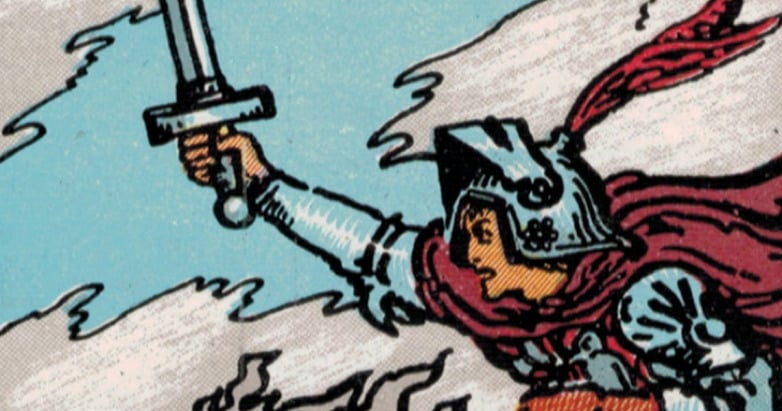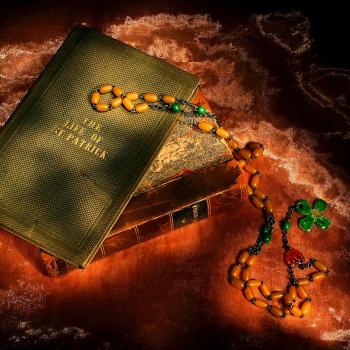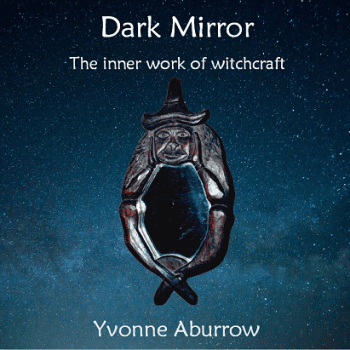[A content warning for this post: I’m discussing issues of sexual abuse in our communities. There are no overt references to any acts or events, but as ever, I encourage anyone sensitive to these issues to exercise caution and self-care. —♥]
Hello, beautiful creatures. Previously on Outside the Charmed Circle, I wrote about the problem of the missing stair in relation to the issue of sexual abuse in the Pagan, polytheist, and occult communities. If you’re unfamiliar with the term, I summarized it as follows: “…the missing stair is that problematic person we all know is a goddamn problem, but who none of us is willing to confront directly or talk about openly. Instead, we whisper in corners, warning people away from them.” I ended that post by saying I know about missing stairs from personal experience, having been on both sides of the whispering in those corners. Today, I’m writing about that experience. It’s a dismayingly common story—one of complicity and community failure—but I’m telling it anyway, because I think it’s necessary.
So, friends, grab a comfy chair, because it’s Storytime with Misha. Today’s story is titled…
How I Became Complicit in Protecting an Abusive Creep
I encountered my first missing stair back in the halcyon days of 1998, when I was a wee baby witch.
Of course, I’d been Pagan of one sort or another for much longer, but I hadn’t really been what you might call “part of the community.” I’d stuck to myself, a solitary neo-Wiccan who only occasionally met with other folks. Over time, I realized I wanted something more than just doing the odd ritual in my bedroom. I wanted to do this stuff with other people, or at least be able to have conversations about it. So, once I actually found my local community—no small feat in the mid-Nineties!—I started engaging with it: going to events, volunteering, meeting people, making friends. Eventually I found myself being “scouted” (for lack of a better term) by some of the elders in the area. Nothing creepy, just polite conversations dropping the occasional hint that, were I so inclined, they’d be willing to take me on as a student. Soon enough, I found myself apprenticed in one of those local covens, and getting to know the local community from more of an inside perspective.
There was an elder member of that community, someone who’d been around literally since before I was born, whose name occasionally came up in conversations. They were apparently a person of some import, someone who’d actually trained and taught some of the people I knew as elders of the community. This sat somewhat at odds with the fact that their name was always spoken in tones of disapproval, even disgust, as though the very thought of them was distasteful. I would ask why this was so, and the answers I got back were always variations on the theme of, “Well, they’re just kind of creepy, and you should stay away from them.”
Of course, being who and what I am, I took this as my cue to ignore my teachers and friends, seek this person out for myself, and make up my own damn mind.
So, I arranged to meet them, and they were… off. Creepy, yes, but part of that creepiness was born of their perfectly mundane affect and manner, as though they genuinely had no idea they were putting off creeper-vibe. When I mentioned that I was studying with a group in town, they made some casual inquiries about who I was affiliated with, then offered to take me on and initiate me if I felt my current situation wasn’t working out. Well, I mean, not in so many words, of course… but the meaning was clear. I was politely noncommittal, and shortly afterwards I took my leave of them.
(It’s worth noting that my gender presentation was similar to that of the person I’d just met. Had it been different, our meeting might well have gone differently. I have no way of knowing, just a suspicion.)
Later, I discussed the encounter with a friend in the community, one of my contemporaries, and she laid things out more clearly than anyone had previously done. This person, I was told, was more than merely socially awkward and creepy. They were manipulative, abusive, casually sexist and racist. More than that, though, they were sexually predatory. Under the ruse that they were the only game in town, magically speaking, they used their position of authority and prestige to coerce students into various sexual acts, all putatively part of their training. Upon learning this was all a bald-faced lie, some of those students left the community, never to be seen again. Others completed their training, then went on to become teachers themselves. Some of those teachers dispensed with the compulsory, coercive sexual elements of the curriculum they had received. Others didn’t.
I was outraged, and I said so to everyone who would listen. Why hadn’t somebody done something about this person? Why hadn’t they called this person out, demanded that they stop abusing people?
There’s nothing to be done, I was told. It’s just the way that person is. Sure, some people might’ve been hurt, and that’s unfortunate, but these things happen. It’s one of the hazards of the path. Besides, this person isn’t really a part of the community these days, anyway. They’re off doing their own isolated thing, and the rest of us are part of the larger Pagan community. It’s not a big deal.
I disagreed. I objected. I argued. I complained. I was a colossal pain in the ass to my teachers, my friends, and my fellow students.
And finally, to my shame, I gave up.
After all, at the end of the day, these things just happen.
And that, friends, is the story of how I became complicit in protecting an abusive creep.
Complicity as an Individual and Communal Failing
Now, you may think I’m being a bit hard on myself. There are certainly things I could’ve done, or done differently, or done better. In my minimal defense, I had no idea at the time what they might’ve been. After all, I was still quite young at the time, and very new to the community. Rather like the Knight of Swords—long on passion and principles, but a bit short on weaponry and armor—I had charged headfirst into a long-standing community problem, only to discover that I had a paucity of both hard evidence and social capital to take on that battle.

That’s how the missing stair stays missing. One by one, step by step, we choose complicity, because choosing otherwise is difficult and expensive, sometimes impossibly so. We choose complicity, and we find ways of justifying that complicity or absolving our own guilt by recasting problems as an unalterable law of nature: “These things just happen. It’s just part of growing up. That’s just how So-and-so is. It’s a challenge on the path.”
Every time we choose complicity, every time we speak those lies, we are protecting abusive creeps, justifying their abuses, and excusing atrocities. Every time we whisper protective warnings to one naïve young person, we’re leaving another one defenseless.
I didn’t write this to ask for absolution, because I don’t think it works that way. If we want absolution for our faults, communal or individual, we’d damned well better start by correcting those faults, and before we can correct them, we have to name them. I know of no other way than to acknowledge our own complicity in the protection of abusers, and in the perpetuation of abuse in our communities.
That’s the first step, anyway. More anon, as I’m sure you were expecting.
Until then, dear ones, be careful with yourselves. ♥
The “Mirror” Series:
















